Glorification of war criminals enrages Chinese veterans
Updated: 2014-01-29 17:27
(Xinhua)
|
||||||||
BEIJING - A visit to the war-linked Yasukuni Shrine by the Japanese Prime Minister and his defense of the act have drawn a stinging rebuke from Chinese veterans who fought against Japanese aggression seven decades ago.
In December, Japanese Prime Minister Shinzo Abe paid his respects to the nation's war dead at the shrine where 14 Class-A war criminals of World War II (WWII), tried at the International Military Tribunal for the Far East, are enshrined.
It was the first visit by a sitting Japanese prime minister in seven years to the temple, despite mounting protests from China and the Republic of Korea who fell victims of the country's atrocities during WWII.
At the World Economic Forum in Davos last week, Abe justified his visit, saying that his "praying for the souls of the departed" should be regarded as "something quite natural for a leader of any country in the world" and that he did not intend to hurt the feelings of its neighbors.
However, Chinese soldiers who survived the war against well-armed Japanese aggressors from 1937 to 1945 said they were hurt and outraged by Abe's "absurd move and remarks".
"When I learned about his words on television, I was furious...His tone made me recall the hatred I felt toward our enemies in the battlefield," said Bao Honghai, 93, a former soldier who lives in Tongchuan City, northwest China's Shaanxi Province.
Bao called for the Japanese government to move memorial tablets of the "killing machines" out of the temple, if not destroying them. "Otherwise, the shrine will continue to serve as a symbol of Japan's resurgence of militarism," he said.
The veteran in good health can still clearly remember horrors of the month-long battle of Tai'erzhuang in 1938, which ended with victory for Chinese troops but at the cost of tens of thousands of casualties.
"We repeatedly lost our position in the daytime, and then took it back during hand-to-hand combat at night when our enemies could not use planes and cannons. Everyone joined the fighting, even cooks," Bao recalled.
A 500-strong special squad dashed into the enemy camp, each equipped with two hand grenades and no guns, and only a dozen of them survived, he said, struggling to hold back tears.
After perpetrating such crimes, a nation has neither reflected on mistakes nor felt grateful for tolerance the victimized country has shown, said Bao, whose three elder brothers died during the eight-year war.
"Being like this, how can it win trust from other nations?" he questioned.
Bao's sentiments were shared by 90-year-old Wen Shengming, another veteran and a local in Sunyuan township, Tongchuan City.
The Japanese leader's visit to the shrine was unjust and has done nothing to help the war initiator gain forgiveness for its past guilt, said Wen.
"In addition, the premier's act has sent a very misleading message to ordinary Japanese people, especially the young generation," he said.
Wen narrowly escaped death while his fellow soldiers hailing from the town fought to death. "I'm glad to have one foot in the grave. I might meet my departed comrades in heaven after I die," he said.
In Xuancheng City, east China's Anhui Province, 95-year-old Liu Baoluo, with gunshot wounds, was also indignant over Abe's visit, denouncing his move as a bold-faced challenge to international justice.
"Tragedies of warfare teach humanity to cherish peace. But if the Japanese leader insists on being against the 1.3 billion Chinese people, I would not hesitate to serve the country again in the battlefield," he said.
Liu Kuanli, a volunteer dedicated to searching for surviving heroes in Tongchuan, said many veterans shed tears when talking about their friends who sacrificed lives for the country.
Every nation has a dream, and so does Japan, said the 46-year-old volunteer. "But it should never achieve its own dream through bringing suffering to other nations."
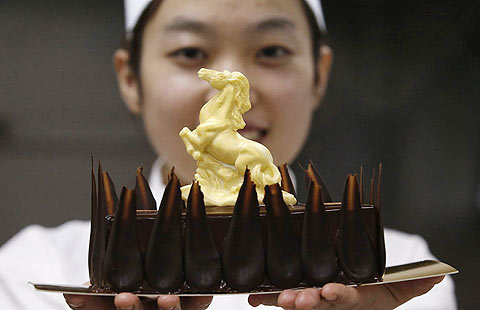
 China welcomes Year of the Horse
China welcomes Year of the Horse
 Musical celebration of Fab Four anniversary
Musical celebration of Fab Four anniversary
 Nice day for a cool white wedding
Nice day for a cool white wedding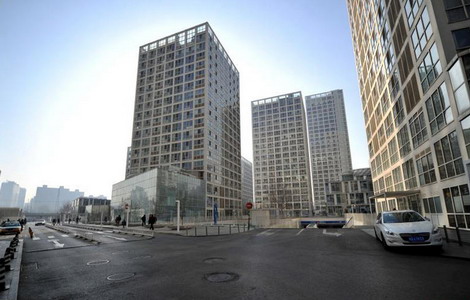
 Home-bound workers ease crowding in Beijing
Home-bound workers ease crowding in Beijing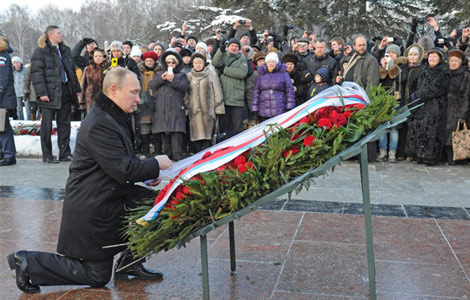
 Putin pays tribute to Siege of Leningrad victims
Putin pays tribute to Siege of Leningrad victims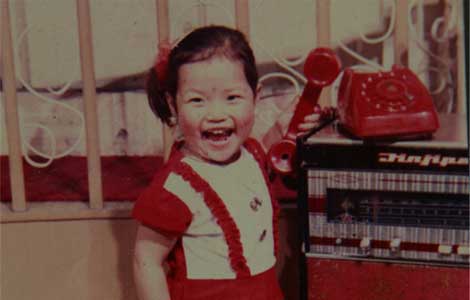
 Chinese ace Li Na before she was famous
Chinese ace Li Na before she was famous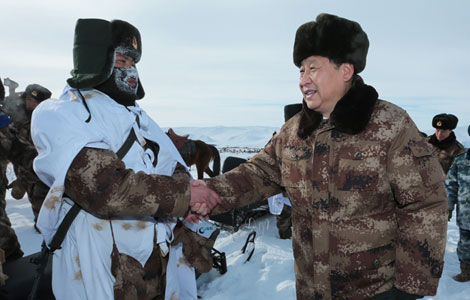
 Xi visits soldiers on frozen northern border
Xi visits soldiers on frozen northern border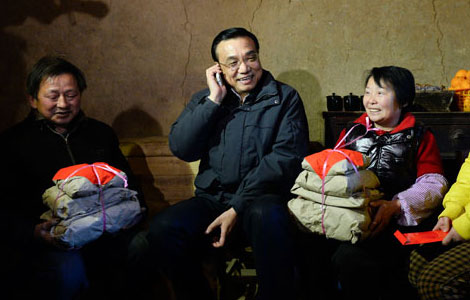
 Premier calls for action to relieve poverty
Premier calls for action to relieve poverty
Most Viewed
Editor's Picks

|
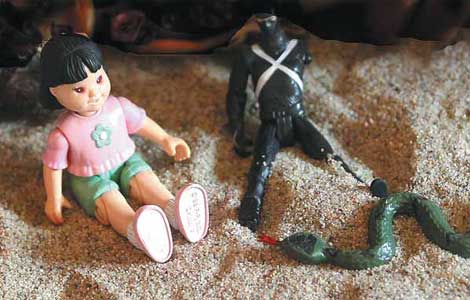
|

|

|

|

|
Today's Top News
China-themed malls a new trend in the Bay area
Replace dollar with super currency: economist
Japan should learn from Germany
Bird flu prompts countermeasures
Hotline on way for Chinese abroad
South China Sea archives open in Hainan
Some good advice for Japan on comfort women
US, UK in app-tapping scandal
US Weekly

|

|





